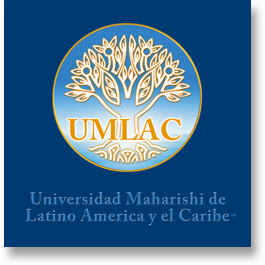MD Integrative Medicine Curriculum
A Systemic Integrative Approach
Medical Schools traditionally structure Modern Medicine programs according to a three-stage cycle in the prevention and healing of the human physiology – Physiology, which includes the normal state – Pathology, the abnormal state – and Pharmacology, the treatment stage. In our integrative curriculum. The unfoldment of the courses in each system develops according to those states.
Our M.D. in Integrative Medicine program defines Integrative Medicine as a Patient-Centered Health Approach that uses Modern Medicine jointly with evidence-based Complementary and Alternative Natural medicines. Our approach to natural medicine is mainly based on Maharishi AyurVeda as explained below.
UMLAC’s Curriculum is a systemic integrative approach including an integration of the Modern Medicine and the Maharishi AyurVeda approach to health on two levels, the level of content and the level of teaching.
Integration of the Content
The integration of the content of the curriculum is based on a systemic curriculum of both, Modern Medicine and Maharishi AyurVeda. The systemic approach to the curriculum is based on the eight major organ systems of the human physiology.
Integration of the Teaching
In order to achieve full integration, the curriculum is also taught in an integrative manner by distinguishing three typical sessions when teaching each organ system:
- Modern Medicine sessions
- Maharishi AyurVeda sessions
- Integrative sessions to integrate both approaches
The nature and content of the three distinctive sessions will be discussed in the following paragraphs.
1 . Modern Medicine Sessions
The sessions in this component offer training for competencies in the physiology, pathology, assessment and management of health disorders from the perspective of Modern Medicine, meeting the requirements for Medical Doctor programs of the Council for Graduate Medical Education (ACGME) of the USA
2 . Maharishi AyurVeda Sessions
The sessions in this component offer parallel to modern medicine training for competencies in the physiology, pathology, assessment and management of health disorders from the perspective of Maharishi AyurVeda and with introductions to other major systems of natural medicine.
3 . Integrative Sessions
The Integration sessions are weekly group discussions where the students in small groups work on a comprehensive clinical case including for each week questions/assignments based on the corresponding topics discussed during that week’s lectures in both approaches. The integrative clinical cases have an important role, they serve to prepare the student to get into the habit to consider both approaches in order to determine which approach or combination of approaches is best for the patient in a particular situation.
The integrative clinical case are tutored by M.D.’s with practical experience in both systems, Modern Medicine as well as AyurVeda.
The Systemic Integrative Courses
The courses in UMLAC’s integrative medicine curriculum are basically of the following categories:
- Science and Technology of Consciousness
- Basic Concepts of Integrative Medicine
- Systemic Integrative Medicine
- English
- Review USMLE
The practical aspect of the program is offered in courses related to:
- Integration Project and Cases
- Integrative Medicine Clinicals
The topics in each semester are the following:
- Semester I
- Science and Technology of Consciousness 1
- Basic Concepts Integrative Medicine 1
- Basic Concepts Integrative Medicine 2
- Semester II
- Clinical Internship – Panchakarma
- Musculoskeletal and Articular systems
- Cardiovascular and Urogenital Systems
- Science and Technology of Consciousness 2
- Semester III
- Digestive System
- Pulmonary (Respiratory) System and ENT
- Semester IV
- Endocrine and Reproductive Systems
- Immune and Hematology Systems
- Science and Technology of Consciousness 3
- Semester V
- Nervous and Integumentary Systems (Skin)
- USMLE Review and Training
Assessment
All courses are evaluated through the following assessments.
- Quizzes (weekly)
- Mid-term Exam
- Comprehensive Final Exam
- Comprehensive Group Case Studies/Projects
- Pulse logs
- Reflective review of Maharishi Videos
At the end of each module, a full week will be reserved, free from lectures, for the Comprehensive Exams and presentation and defense of the Comprehensive Group Project/Case Studies.
MD Integrative Medicine Program
School of Integrative Medicine
Our Unique Approach
Vision & Goal
The goal of the School of Integrative Medicine is to fulfill the current global need to provide a holistic and scientific system of health care for prevention and cure, for both individual and collective health.
At this Medical School all the main topics of modern medicine and Maharishi Ayurveda are studied in light of their basis in Total Knowledge—the Veda—the inner intelligence of human physiology; and in light of the student’s experience of developing higher states of consciousness.
Maharishi Ayurveda
Maharishi Ayurveda is the ancient and timeless Vedic approach to medicine, which was brought to light in this scientific age for its authentic value of theory and practice by Maharishi Mahesh Yogi, in conjunction with the world’s foremost experts in Ayurvedic Medicine and physicians and scientists in modern medicine.
